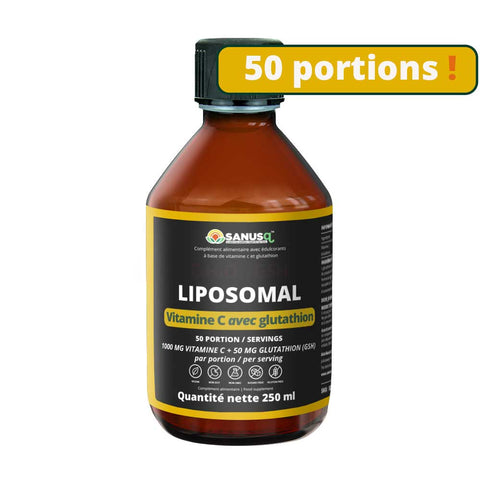SANUSq Health: Liposomal Glutathione - 250ml
Liposomal Glutathione for powerful ‘detox and antioxidant’ support
📅 Best before: 30 September 2026
🌍 Origin: The Netherlands
✅ Registered with DGCCRF (France): #2022-10-494
- French government certified for safety and compliance [View PDF Certificate]
🔖 SKU: BSL03-SR13-250
📊 Barcode: 0792649289914
(Check our current promotions before buying)
Main ingredients: (per 5 ml) 180 mg reduced L-glutathione. Refer to label for full list of ingredients.
Suggested daily dosage: 2 x 5 ml directly in mouth or glass of water or juice, unless otherwise advised by a healthcare professional. Do not exceed recommended dosage. Discount bundle available (Click here)
Recommended serving size: 10 ml
Servings per bottle: 25
Storage: Store cool and dry. When opened store in refrigerator and finish within 2 months
Product description
- Registered with the DGCCRF (France) #2022-10-494 [View PDF Certificate]
- Official French government certification ensuring compliance with EU supplement safety standards.
- 360mg Glutathione - reduced form – per serving
- Liposomal glutathione for improved bioavailability and absorption
- Vegan, Non-GMO Sunflower, Sugar free, Gluten free
- Screw top bottle with measuring cup
- Supports immune system and reproductive organs
- Breaks down free radicals and regenerates Vitamin C and Vitamin E
- Helps remove mercury from the brain
Glutathione Health Benefits in a nutshell
- Powerful antioxidant, protects cells from oxidative damage
- Reduces inflammation
- Helps in detoxification process
- Strengthens immune system
- Helps in the formation of red blood cells
- Improves energy levels
- Helps in DNA synthesis and repair
- Protects DNA against radiation damage
- Delays premature ageing
- Supports overall health
Why do you need Glutathione?
Also known as master-antioxidant, glutathione is a simple molecule made up of three amino acids (the building blocks of proteins) – cysteine, glycine and glutamine.
- Every cell in the body makes its own glutathione.
- Glutathione traps free radicals and toxins and removes them from the body.
As you age, your body does not make as much glutathione as it did in your peak years. In fact, glutathione production in the body begins to decline after you hit your 20s. Unhealthy lifestyle, medications, infections, chronic stress and exposure to chemicals and toxins lead to excessive production of free radicals, and cause your body to use more glutathione (and also other antioxidants) to neutralize free radicals and limit the oxidative damage. This leads to glutathione deficiency. Poor magnesium levels also create a shortage of glutathione as you need magnesium to make this master-antioxidant.
Low levels of glutathione lead to increased oxidative damage and accumulation of toxins – causing chronic inflammation, faster ageing and poor immunity.

1. Glutathione: One of the most powerful antioxidants your body makes
Glutathione is popularly known as the “mother of all antioxidants’ or “master antioxidant” and it is not without a reason. It is one of the most powerful endogenous antioxidants (produced by the body on its own). Since it is present within the cells, it offers cells and its fragile structures first-hand protection from oxidative damage.
- Regenerated in the liver once it has been used by the body
- Strengthens body’s antioxidant power by reactivating other important antioxidants such as vitamin C, vitamin E, CoQ10 and alpha-lipoic acid
- Protects DNA from oxidation during cell division
- Repairs DNA damage
- Protects immune cells from oxidative damage
- Destroys hydroxyl free radicals, the most harmful species of free radicals that are produced during exposure to ionizing radiation.
2. Glutathione in detoxification and liver function
Glutathione plays a very important role in eliminating all kinds of toxins from the body, including heavy metals, drugs and chemicals. Accumulation of heavy metals and oxidative damage impacts brain health in particular. These two factors are strongly associated with the development of Parkinson’s and Alzheimer’s disease.
- Protects liver from the oxidative damage due to free radicals, produced during detoxification process.
- Binds with toxins so they are water-soluble and can be easily expelled from the body through kidneys, intestines and skin. By making toxins water soluble, glutathione prevents them from being retained in fatty tissues and causing long-term damage.
- Can help in non-alcoholic fatty liver disease [3]
3. Glutathione in immunity
Glutathione plays a huge role in both innate (natural) and adaptive (acquired) immunity. Low levels can adversely affect immune functions, making you vulnerable to developing infections. All immune cells, including T cells, produce glutathione.
- Increases the production of white blood cells
- Activates immune cells
- Protects immune cells from oxidative damage caused by toxic by-products that are naturally produced when your immune system fights pathogens.
- Activates natural killer cells that help control the growth of TB (tuberculosis) causing mycobacteria [1]
- Helps T cells to produce energy and launch immune responses required to fight infections and even cancer. [2]
4. Glutathione in exercise performance
There are many reasons why glutathione is used by athletes to boost their exercise performance. Heavy, strenuous exercise triggers excessive production of free radicals that not only cause oxidative damage in the muscle cells but also promote inflammation, increases soreness in muscles and supresses immunity. This results in muscle fatigue, burn-out and poor exercise performance. Glutathione improves exercise performance as it:
- Reduces oxidative stress caused by exercise
- Reduces muscle fatigue and improves energy levels
- Helps in tissue repair and faster recovery
- Improves heart function
- Boosts immunity and reduces risk of infections
What do low glutathione levels mean for your health?
- Increased oxidative damage and chronic inflammation
- Reduced energy levels
- Poor liver function and reduced ability to get rid of toxins
- Poor immune functions and increased risk of infections
- DNA damage
- Premature cellular ageing and increased risk of age-related chronic diseases
Bonne Sante Liposome Glutathione
Regular oral glutathione supplements may not be very helpful in increasing your glutathione levels because of poor absorption and bio-availability. Most of the glutathione, when ingested, is broken down by the elements of the digestive system. So, only a very small amount is able to enter the bloodstream – leading to poor bioavailability and poor absorption rates. Bioavailability is the amount of a substance available for the cells to use and absorb. This is where a high quality liposomal glutathione supplement can help:
- Improves absorption and bioavailability
- Contains reduced form of glutathione (GSH), a form that can readily neutralize free radicals by donating electrons
- Contains vitamin E which helps boost GSH levels
References:
- Allen et al. Mechanisms of control of Mycobacterium tuberculosis by NK cells: role of glutathione. Front. Immunol. 2015.
- T W Mak et al. Glutathione Primes T Cell Metabolism for Inflammation. Immunity. April 2017.
- Honda et al. Efficacy of glutathione for the treatment of nonalcoholic fatty liver disease: an open-label, single-arm, multicenter, pilot study. BMC Gastroenterology. 2017

Disclaimer
Information on our websites, in our blogs and our emails are provided for informational purposes only, and have not been evaluated by the EMA, EFSA or FDA. It is not meant to substitute medical advice provided by your healthcare professional and is not intended to diagnose, treat, cure, or prevent any disease. Our products are intended for adults, 18 years of age and older. While Glutathione has been shown to have various health benefits, it is important to remember that supplements and dietary changes should be considered as part of an overall health plan and not as a substitute for professional medical treatment. Only a qualified healthcare practitioner can provide personalized advice and treatment plans based on your individual health needs and medical history, and you should seek advice from your healthcare professional before taking product(s) if you are pregnant or nursing.


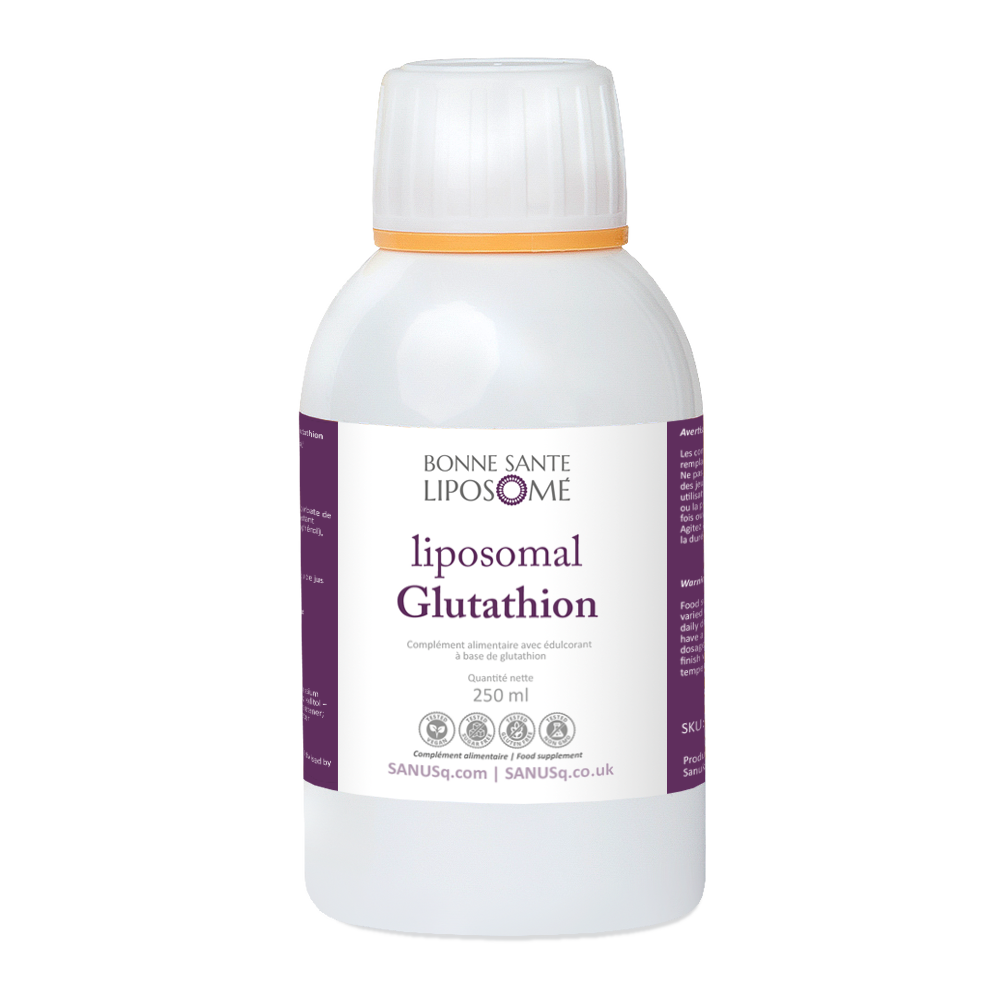
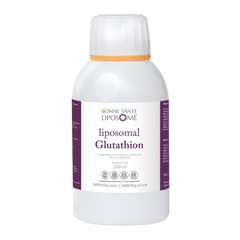
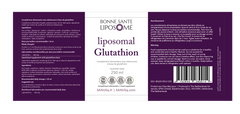
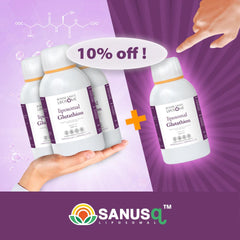
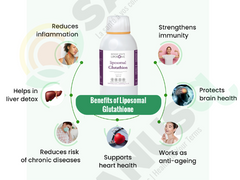

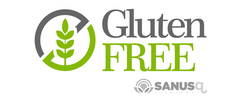
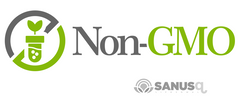


 Pin it
Pin it